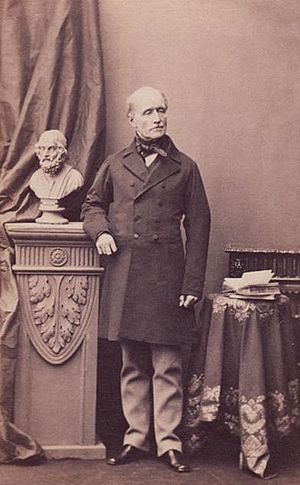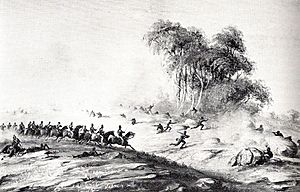Charles Yorke (British Army officer) facts for kids
Quick facts for kids
Sir Charles Yorke
|
|
|---|---|

Sir Charles Yorke
|
|
| Born | 7 December 1790 |
| Died | 20 November 1880 (aged 89) Mayfair, London |
| Buried |
Kensal Green Cemetery, London
|
| Allegiance | |
| Service/ |
|
| Years of service | 1808–1860 |
| Rank | Field Marshal |
| Battles/wars | Peninsular War Hundred Days Xhosa Wars |
| Awards | Knight Grand Cross of the Order of the Bath |
Sir Charles Yorke (born December 7, 1790 – died November 20, 1880) was a very important officer in the British Army. He fought in many big battles during the Peninsular War and the Hundred Days. He was even at the famous Battle of Waterloo. Later, he helped lead British forces in South Africa during the Xhosa Wars. He became a Military Secretary and eventually reached the highest rank in the army: Field Marshal.
Contents
Becoming a Soldier
Charles Yorke started his army career on January 22, 1808. He joined the 35th Regiment of Foot as an ensign, which is a very junior officer. Soon after, he became a lieutenant and moved to the 52nd Light Infantry.
Fighting in the Peninsular War
Yorke fought in the Peninsular War, a long conflict in Spain and Portugal. He was part of many important battles:
- The Battle of Vimeiro in August 1808.
- The Battle of Fuentes de Oñoro in May 1811.
- The Battle of Ciudad Rodrigo in January 1812.
- The Battle of Badajoz in April 1812, where he was injured.
After he recovered, he continued fighting. He was at the Battle of Salamanca in July 1812 and the Battle of Vitoria in June 1813. He also fought in the Battle of the Pyrenees in July 1813, and the Battle of Nivelle and Battle of the Nive in late 1813. In January 1814, he was promoted to captain. He was wounded again at the Battle of Orthez in February 1814.
The Battle of Waterloo
Yorke also took part in the Hundred Days, which was a short period when Napoleon returned to power. He served as an extra helper, called an aide-de-camp, to Major-General Frederick Adam. He was with him at the famous Battle of Waterloo in June 1815, where Napoleon was finally defeated.
Later Military Roles
After the Napoleonic Wars, Yorke continued his career. He was promoted to major in 1825 and then to lieutenant colonel in 1826. He became an inspecting officer for the militia, which was a local defense force.
Service in South Africa
In 1850, Yorke was sent to South Africa. He became the Deputy Commander of British forces there, working under General George Cathcart. He played a role in the later parts of the Eighth Xhosa War. His job was to make sure the areas behind the front lines were safe and that the troops had enough supplies. He was promoted to major-general in November 1851.
Military Secretary and Field Marshal
In May 1854, Yorke became the Military Secretary. This was a very important job where he advised senior leaders like Viscount Hardinge and the Duke of Cambridge. He was recognized for his excellent work and received the Knight Commander of the Order of the Bath award in 1856. He was promoted to lieutenant general in 1859 and retired from active service in June 1860.
Even after retiring, he continued to serve. He was given an even higher honor, the Knight Grand Cross of the Order of the Bath, in 1860. He also joined a special group in 1863 to check on how the Indian Army was being reorganized. In 1865, he became a full general.
In April 1875, he was appointed Constable of the Tower, a historic role at the Tower of London. Finally, on June 2, 1877, he reached the highest rank possible: Field Marshal.
Personal Life
Sir Charles Yorke never married and did not have any children. He passed away in Mayfair, London, on November 20, 1880, at the age of 89. He was buried at Kensal Green Cemetery.
 | Misty Copeland |
 | Raven Wilkinson |
 | Debra Austin |
 | Aesha Ash |


